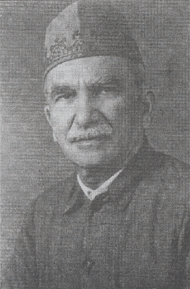|
| Jamshed Nusserwanjee Mehta was born in Karachi
on 7th January 1886 into a wealthy and well known Parsi
family. His childhood was a happy one, and from a very
early age it was evident that the child had a deeply spiritual
nature. He was intensely compassionate and his deep love
for animals led him to become a vegetarian at the age
of 13 after witnessing the agony of a cow begin pulled
to the slaughter house.
After completing his education Jamshed entered his
fathers business. He was known for his hard work and
honesty, and earned the deep esteem of the mercantile
community both in India and abroad.
As a young man he was elected as councillor of the Karachi
Municipal Corporation. He displayed such a profound
civic sense and concern for the welfare of the people
of Karachi, that within a few years he was elected as
the President of the Corporation.
|

|
He served in that capacity for 12 years and after partition
became the first mayor of the city. He turned Karachi into
a large well planned modern city, the cleanest in the sub-continent
with broad clean roads (which were washed every night!) good
sanitation, shady trees, parks, schools, libraries, hospitals,
clinics and maternity homes; co-operative housing and co-operative
banking, veterinary service and water troughs for animals,
are just some of the amenities the citizens of Karachi (both
human and animals) enjoyed.
Jamshed joined the Theosophical Society after hearing a lecture
by Mrs Annie Besant (who was then the International President
of the Society) while he was on a visit to Bombay. From that
day onwards the Theosophical Society had in Jamshed an ardent
and tireless worker. He started a study group in Karachi which
met at the Theosophical Society every Saturday and this tradition
continued up till his death in 1952.
Parsis, Muslims, Hindus and Christians all were his brothers
and he encouraged all communities to work together for the
betterment of their city. Harmony and tolerance permeated
the atmosphere, and the different communities celebrated each
others festivals together in a spirit of fraternity and goodwill.
With his passing, the city of Karachi lost its greatest citizen,
one who made brotherhood a living reality in his life and
in the life of the citizens of Karachi.
|
|